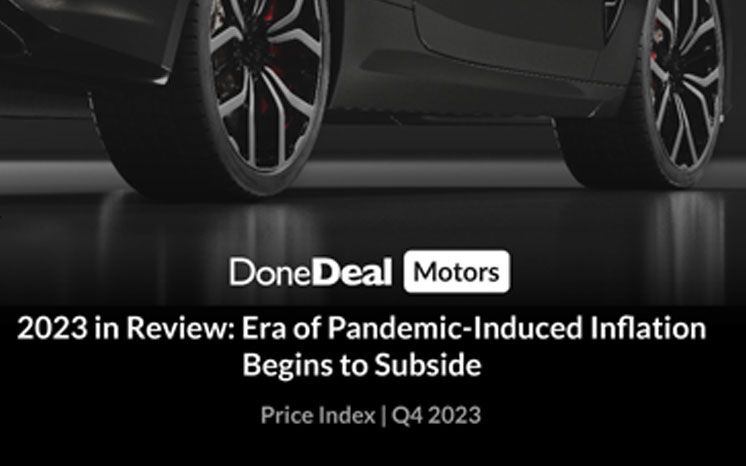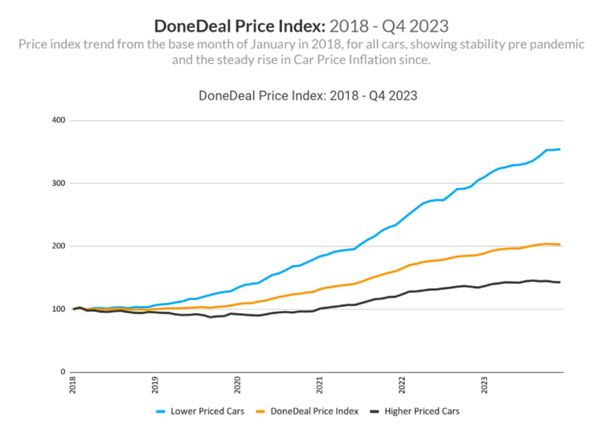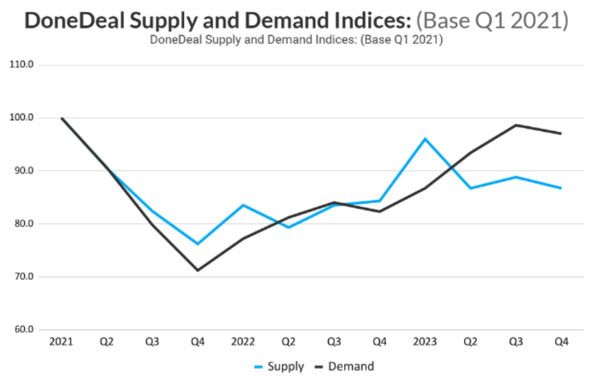DoneDeal Survey: Era of pandemic-induced inflation begins to subside

Reviewing a year's worth of DoneDeal car price data enables a thorough analysis of the 2023 used car market in Ireland.
When compared to the three previous years (2020-2022), price growth in 2023 has eased considerably. The lingering effect of the pandemic microchip shortage, coupled with Brexit and then the outbreak of war in Ukraine caused significant disruption to both the supply of, and the demand for, used cars. This was characterised by unprecedented price inflation: 4.8% inflation per quarter on average over the period 2020 – 2022 (21.6% average year-on-year inflation), with most used cars going up in value as inflation outweighed normal rates of depreciation.
This era of sharp price inflation moderated noticeably in 2023: The average quarterly rate of inflation slowed to 2.2%, while the annual rate of inflation slowed to 9% in Q4 year on year, down from 10.5% in Q3 year on year, the lowest since 2019. In fact, in Q4 there was no change in prices compared to the previous quarter, something also not observed in the DoneDeal price data since 2019. Despite the slowdown of inflation in 2023, prices of used cars are still 85% higher now than they were at the start of 2020.

The slowdown in price inflation in 2023 could be attributed to several supply and demand side factors. On the demand side, the cost-of-living crisis inevitably means that big ticket items such as cars are given more careful consideration from a household budget perspective, dampening demand. In-depth analysis of ad view trends on DoneDeal gives an insight into consumer demand over the past year. Compared to Q4 2022, ad views are up just 3% in Q4 2023. In terms of supply, wait times for new cars have reduced to more normal levels as microchip production caught up with demand in the motor industry, in turn, this eases the pressure on the almost-new used car market. On DoneDeal, the number of active car listings is up 21% when comparing the stock of active ads on December 1, 2022, to December 1, 2023.
Concentrating on the overall inflation rate across all car price ranges obscures the tale of two distinct sides. Throughout this period of inflation, there has been a notable contrast in inflation between the higher and lower ends of the market. The impact of supply and demand on inflation varies significantly when comparing lower-priced cars (< €6,000) to higher-priced cars (>€20,000). In the upper echelon of the market, Q4 witnessed a 1.1% rate of deflation.
In contrast, the lower end of the market experienced a 3% increase in prices in Q4. Many individuals residing in rural Ireland, particularly those with lower incomes, heavily depend on cars for transportation. Consequently, the demand remains relatively stable within this demographic. The combination of this essential demand and constrained supply due to Brexit restrictions continues to propel inflation in the lower end of the used car market. As prices persistently increase in this segment, cars become less affordable, obsolete on safety standards, and exhibit higher emissions.

DoneDeal’s Motor Price Index is the result of independent third-party economic analysis of DoneDeal’s data by economist Tom Gillespie.
Despite the challenges associated with phasing out older and more polluting cars from Irish roads, positive developments persist in the SIMI statistics for new registrations. In 2023, 121,850 new cars were registered in Ireland, up from 105,216 in 2022, an increase of 16%.
Imports of used cars in 2023 were up 9% to 50,717 on 2022, the first annual increase since 2019. However, still fewer than half the number of imports compared to 2019’s 113,912. Brexit restrictions continue to hamper the importation of cars from our closest neighbour. The share of total imports from the UK in 2023 was just 29%, down from 96% in 2018. Of these new registrations in 2023, 22,789 were EVs, an increase of 45% from the number of new EVs registered in 2022. In the second half of 2023, EVs accounted for 19.2% of new registrations, hybrids 29.3%, Diesel 22.5%, and petrol 29%.